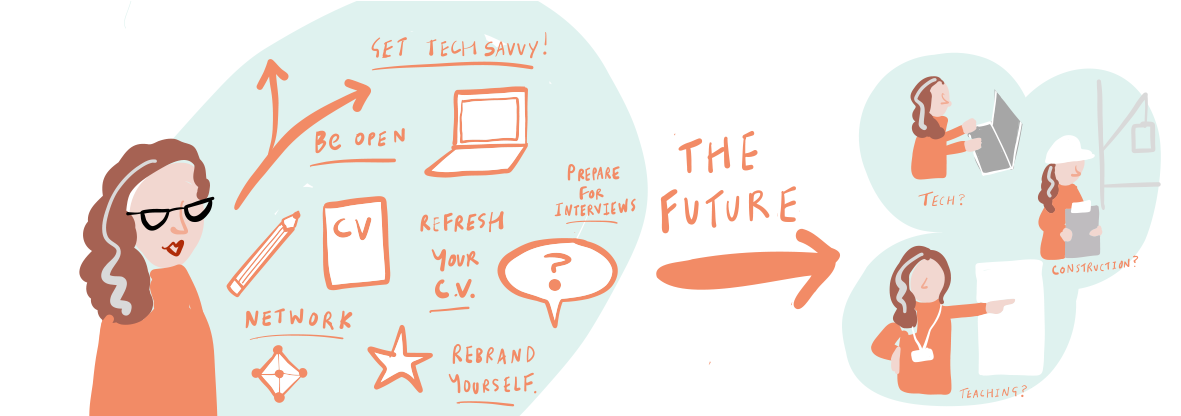How to Make a Midlife Career Change

Starting over with a midlife career change might sound a little scary, but it doesn’t have to be hard. A career change at 50 could be the positive change you need to redefine your professional path and pursue new passions.
Imagine finding renewed fulfilment in your work and feeling excited to wake up every morning. It’s all possible with a career change. If you’re willing to step outside your comfort zone and explore new opportunities, embarking on a new career journey in the middle of your life can be an exciting and refreshing experience. Read this article and you’re well on your way.
Reasons for a Midlife Career Change
You might be wondering, “Why would anyone want to make a career change at 50?” Well, for the same reasons why you want to make that career change at 30, or 40 or even 60. Maybe you’re stuck in your comfort zone, your goals have changed or your current job just isn’t doing it for you anymore. Here are some of the most common reasons for wanting a career change:
Job Dissatisfaction
Sometimes, you can feel like you’re stuck in a career that no longer makes you happy. This feeling of job dissatisfaction or being in a professional rut is a common reason for wanting a change of career at 50 or any other age.
Personal Fulfillment
When you reach your 50s, you may start thinking more about what you’re truly passionate about or realise you want to do something that aligns with your values and overall sense of purpose and that’s great. It’s time to chase your joy.
To Make More Money
You read that right. Sometimes it’s really not that deep. It’s as valid as any other reason for wanting to advance professionally. Everybody wants to make more money and that desire is present at any age.
Seek New Challenges
Doing the same old routine for years and years can be boring. People often crave new experiences after spending many years in the same field. Tired of your desk job and think you want to try your hand at car racing at 50? This is your cue to send in that resignation letter.
Tips for Navigating a Midlife Career Change
So you’ve decided you want a change of career at 50. Here are some tips to make the process easier:
Don’t be Scared
A midlife career change can be scary, but it’s also thrilling to embrace the unfamiliar and all the new possibilities that come with it. Go get ‘em.
Set Realistic Expectations
Having big dreams is awesome but being practical is more awesome. Look at where you are right now and where you’d like to be.
Once you’ve done that, write down all the skills and experiences you have, and how long it might take you to achieve your goals. Most people have lots of transferable skills. This exercise will help you spot any potential gaps in your skillset that you’ll need to cover off. It will help you set realistic goals and expectations. Don’t be surprised if you know more than you thought.
Update Your CV and LinkedIn
It’s a smart move to start updating your skills and credentials as soon as possible if you’re thinking about changing careers. You’re simply giving yourself a head start and increasing your chances of success in your dream career.
There are so many ways for you to go about this. You could take online courses, attend workshops or seminars if that’s your thing or seek mentorship from experts in your target industry.
Get Familiar With the Gen-Z Way of Doing Things
Yeeees, things are different now and there are so many things to unlearn and relearn. It’s not as taxing as it sounds. In fact, it just might be what you need to get you excited again. Understanding Gen Z’s way of doing things can help you connect with younger colleagues.
You could look at reverse mentoring and find a younger mentor to help you brush up on new developments and trends in tech.
How to Change Career at 50
Here are a few steps to help with your midlife career change:
1. Self-Assessment
Make a list of all the things you’re good at and areas where you could improve. Also, make a list of the things that matter most to you and your short and long-term goals. Pinpoint the skills and experiences you already have that can be useful in your new career.
Putting these details down may appear to be a waste of time but once done, it becomes clear what you need to do next. Switching from communications to engineering, for example, is not feasible because the skill sets required for both are too different. However, if you’re determined to make such a change, you’ll need to study or retrain.
So let’s assume you’re transitioning from communications to operations…feasible right? Yes! When you’re trying to choose a career path, identify what job you want and put it side by side with the skills you have. If your skills aren’t transferable, you might want to either choose another career path that’s compatible with your current skill set or take courses to improve the gaps in your skills.
2. Networking
Networking is very important during a job search; it can help you make valuable connections, and even receive job referrals! If done right, your chances of landing a job are tenfold higher.
So go to those often-dreaded networking events, hang out with people in the industry you want to be in, join online communities and build meaningful relationships with people in your desired fields.
3. Decide on a Career Path
Make a list of possible careers you see yourself doing and narrow it down to one or two you fancy the most but before you make your final decision, do some research into each job on your list and pick the one that suits your current skillset, your interests, your core values and your salary needs.
4. Rebrand Yourself
This should be exciting. Get familiar with the industry’s language and practices so you don’t stick out like a sore thumb. Take new headshots and update your LinkedIn profile to reflect your new career. This would show potential employers or clients that you’re a good fit!
5. Be Open-Minded
Come to terms with the fact that switching careers at 50 may require some flexibility. So you must be open to starting at entry level or taking on contract jobs to gain experience, But not to worry, if you remain optimistic and embrace the learning curve that comes with a midlife career change, you’ll soon make it to the top.
6. Optimise Your CV and Cover Letter
Now that you’re switching jobs, you’re going to need a new resume and cover letter. When customising your CV, shine a spotlight on the skills and experiences that matter most in your new career.
Focus on transferable skills that can be valuable in any industry. Blow your trumpet too; you’ve accomplished so much in your former career that could be a testament to soft skills that are needed in every field.
7. Prepare for Interviews
You cannot be overprepared for an interview. A lot goes into making sure you ace it. You can start by researching common interview questions usually asked in the field you’re transitioning into. Practice your responses to these questions until you’re sure you can confidently articulate them.
During the interview, interviewers are always looking out for people who are excited about the industry. So don’t hesitate to show how enthusiastic and passionate you are. Express your reasons for choosing this career path and how it aligns with your interest and values.
If you have previous experiences that can be used in this new field, don’t hesitate to speak about them! Lastly, always familiarise yourself with the company you’re interviewing with; get to know their mission, vision, values and recent projects. This shows them you’re genuinely interested in working with them.
How Mentoring Can Help You Navigate a Midlife Career Change
Many people feel overwhelmed when making plans for a midlife career change. You should know that it’s perfectly normal to feel this way at first; you’re literally starting a major part of your life all over again.
But you’ve thought this through and you’ve come to the conclusion that this is the best decision for YOU; you want to be happier; you want a new challenge or higher pay – all of which are great, valid reasons. One thing that would help make any career change at 50 easier is having a mentor who will guide you during your career transition.
Here’s how a mentor can help you navigate the ups and downs of changing careers:
- Listen to you
- Cheer you on
- Offer advice on your CV
- Help you prepare for an interview
- Give qualified opinions about career opportunities you come across
Where to Find a Career Change Mentor
Right here! When you sign up with Career Navig8r, you can sort through a diverse pool of mentors from a variety of industries and roles. Take the time to read their profiles and find a mentor you think you can connect with.
All the help, support and guidance you need to successfully navigate your career transition are here. Sign up today.


